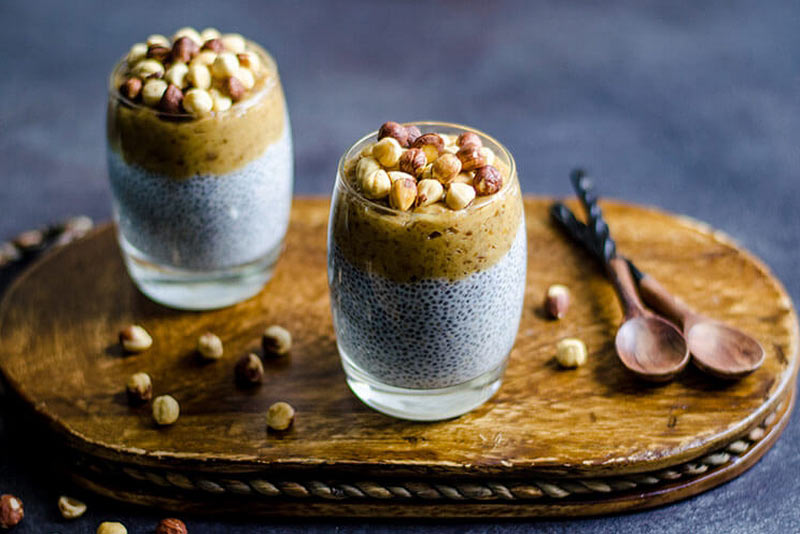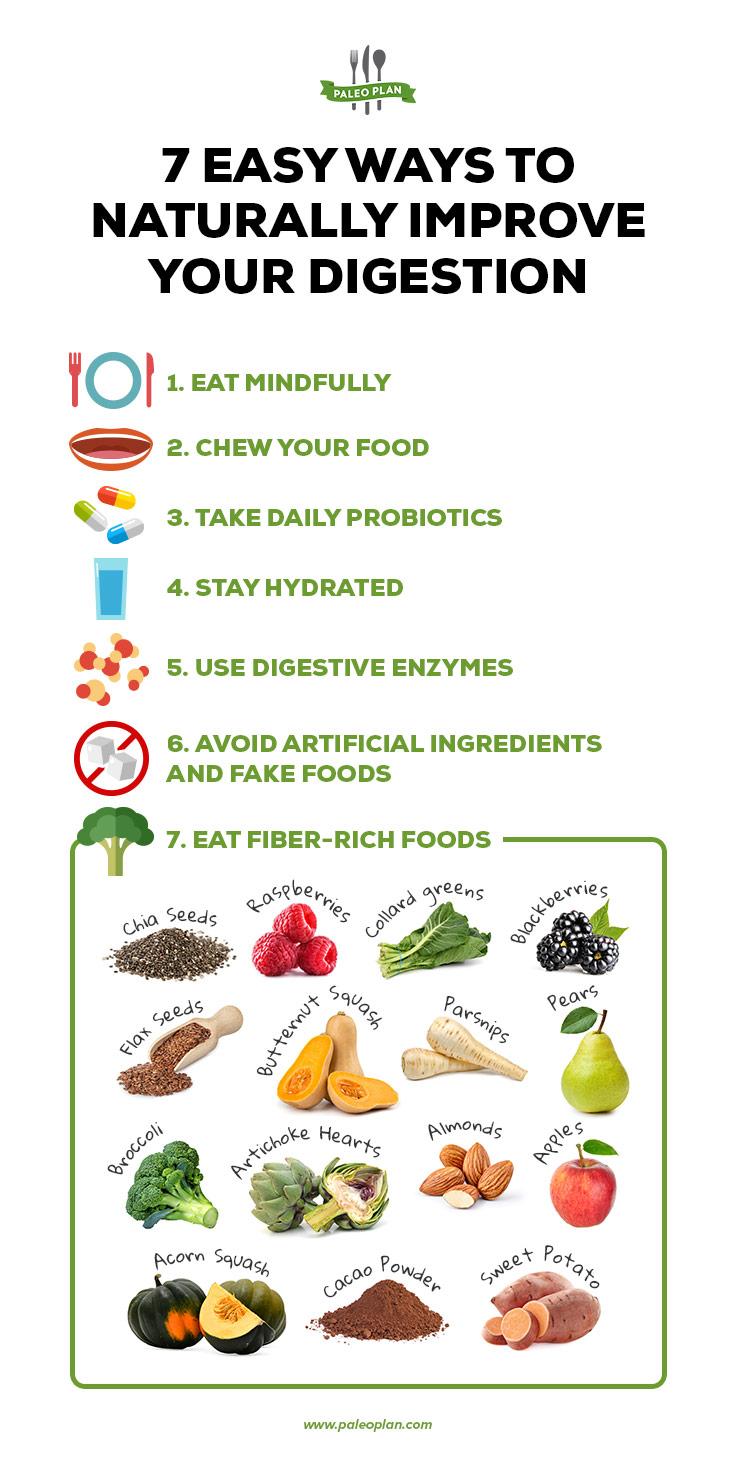7 Easy Ways to Naturally Improve Your Digestion

Digestion is one of those things we never think about—unless it isn’t working properly. As many as 70 million people experience digestive disease and disorder, making it a top problem in the modern world. (1)
Prescriptions seem only to address symptoms and don’t correct underlying problems. Plus, they come with side effects that can lead to other health problems down the road. (2, 3)
The good news is that there are some basic, natural ways to address digestive health, and they don’t come with the hefty dose of side effects.
Note: do not discontinue medication unless your doctor tells you to do so. Run all prescription, supplement, or dietary changes by your practitioner.
1. Eat Mindfully

Most of us today eat in a state of chaos, rushing, or stress. This is a big reason why digestion has become such a widespread problem. In order for the parasympathetic nervous system to handle the “rest and digest” phase, we need to be a state of relaxation.
While it can feel difficult to transform the way that you eat, making small changes can help. Choose one meal a day to focus on with intent. Mindfully eat, taking the time to appreciate the smell, taste, and texture of your meal. If you can, make it a relaxing affair that lasts at least 15 minutes so you can enjoy it.
Research shows that eating in a calmer environment can help reduce ulcers, constipation, diarrhea, and IBS symptoms (4, 5, 6)
2. Chew Your Food
Sometimes you take a bite, chew a few times, and swallow. This might be how you always eat, but this is far from optimal for digestive function.
When improperly chewed food enters the stomach, large particles can pass on to the intestine and stay there longer than intended. It can even start to ferment, leading to bloating, gas, and bacterial imbalances like SIBO (small intestinal bacterial overgrowth). It can also contribute to poor levels of nutrient absorption. (7)
While there is no set amount of chews needed per mouthful, food should not be remotely solid or “chunky” when you swallow. This likely translates into chewing your food three or four times longer than the typical rushed eater.
3. Take Daily Probiotics
Probiotics are the good bacteria that populate the microbiome, which is a part of the large intestine. Good bacteria needs to be replenished regularly and probiotic supplements are a digestive-friendly way to do that. Fermented foods also contain probiotics. However, for people already suffering from digestive problems, fermented foods can sometimes worsen the symptoms.
Probiotics can help to improve digestive discomforts like bloating, gas, and intestinal pain. (8) They can be taken daily—typically before bed—and come in different strains. Choose a broad-spectrum supplement without any fillers for the best results, and aim for at least 25 to 50 billion colony-forming units daily.
4. Stay Hydrated

Not having enough water in your body can make digestive transit harder, so hydration is vital for a healthy digestive system. However, you don’t want to drink all of your fluids with meals, since large amounts of water can dilute stomach acid and lead to problems breaking down food. While it’s okay to still drink water with meals, try to consume the bulk of your daily water when you’re not eating.
The amount of water required for proper hydration can vary based on sex, activity level, health, and more. Still, opting for half your body weight in ounces is a good starting point.
5. Use Digestive Enzymes
If low stomach acid is a problem, or other digestive symptoms are common, digestive enzymes might help. The body produces enzymes to help break down food, but sometimes levels may be too low or suppressed by existing digestive issues or other health problems.
There are three main enzymes: amylase, lipase, and protease.
Amylase helps break down starches into their simple sugar forms, making glucose usable for the body. Lipase breaks down fat, and protease breaks down proteins into amino acids.
Supplemental enzymes can come in many forms. Make sure to choose a pancreatic enzyme product that is taken before or during meals, and that comes from a reputable brand. Ask your health practitioner for recommendations.
6. Avoid Artificial Ingredients and Fake Foods
Sometimes we fall into the trap of opting for too many convenience foods. Even Paleo or gluten-free packaged foods can contain preservatives or other ingredients which are harder to digest.
Food additives, including simple sugars, salt, preservatives, and other chemicals, can contribute to inflammation in the digestive tract. This can cause uncomfortable symptoms along with issues breaking down foods and absorbing nutrients. (9) Artificial sweeteners and sugar alcohols can also do a number on the digestive tract, often leading to diarrhea or other intestinal disturbance. (10)
7. Eat Fiber-Rich Foods

A diet that is focusing on Paleo foods will naturally be filled with fiber-rich vegetables, fruits, nuts and seeds. Fiber boosts digestive function and supports healthy elimination. Without it, the digestive system can struggle to move digested food through the intestines. Lack of movement can result in bloating, gas, and bacterial imbalances when food gets trapped or slowed in its transit time. (11)
Eating plenty of fiber also helps to reduce development of digestive diseases like diverticulitis and other irritable bowel disorders. (12)
An optimal fiber intake is at least 28 to 30 grams daily, but more can definitely be better!
Paleo foods that are rich sources of fiber include:
- Acorn squash (1 cup = 9g)
- Chia seeds (2T = 8g)
- Raspberries (1 cup = 8g)
- Collard greens (1 cup = 8g)
- Blackberries (1 cup = 8g)
- Flax seeds (2T = 7g)
- Butternut squash (1 cup = 7g)
- Parsnips (1 cup = 6g)
- Pears (1 medium = 5g)
- Broccoli (1 cup = 5g)
- Artichoke hearts (1/2 cup = 5g)
- Almonds (1/4 cup = 5g)
- Apples (1 medium = 4g)
- Cacao powder (2T = 4g)
- Sweet potato (1 medium = 4g)
Bottom Line
Digestive function is vital for overall wellness, because we’re only as healthy as the nutrients we can absorb. Even a pristine diet is worthless if we can’t break down the foods and make use of the nutrients they contain. These natural ways to boost digestive function are simple and can easily become part of a healthy Paleo way of eating.

Read This Next: 15 Ways To Address Heartburn with Diet and Natural Remedies
The post 7 Easy Ways to Naturally Improve Your Digestion appeared first on PaleoPlan.
from PaleoPlan https://ift.tt/2N4Zwp3
Entry Published : September 26, 2018 at 07:21AM
EntryContent :

Digestion is one of those things we never think about—unless it isn’t working properly. As many as 70 million people experience digestive disease and disorder, making it a top problem in the modern world. (1)
Prescriptions seem only to address symptoms and don’t correct underlying problems. Plus, they come with side effects that can lead to other health problems down the road. (2, 3)
The good news is that there are some basic, natural ways to address digestive health, and they don’t come with the hefty dose of side effects.
Note: do not discontinue medication unless your doctor tells you to do so. Run all prescription, supplement, or dietary changes by your practitioner.
1. Eat Mindfully

Most of us today eat in a state of chaos, rushing, or stress. This is a big reason why digestion has become such a widespread problem. In order for the parasympathetic nervous system to handle the “rest and digest” phase, we need to be a state of relaxation.
While it can feel difficult to transform the way that you eat, making small changes can help. Choose one meal a day to focus on with intent. Mindfully eat, taking the time to appreciate the smell, taste, and texture of your meal. If you can, make it a relaxing affair that lasts at least 15 minutes so you can enjoy it.
Research shows that eating in a calmer environment can help reduce ulcers, constipation, diarrhea, and IBS symptoms (4, 5, 6)
2. Chew Your Food
Sometimes you take a bite, chew a few times, and swallow. This might be how you always eat, but this is far from optimal for digestive function.
When improperly chewed food enters the stomach, large particles can pass on to the intestine and stay there longer than intended. It can even start to ferment, leading to bloating, gas, and bacterial imbalances like SIBO (small intestinal bacterial overgrowth). It can also contribute to poor levels of nutrient absorption. (7)
While there is no set amount of chews needed per mouthful, food should not be remotely solid or “chunky” when you swallow. This likely translates into chewing your food three or four times longer than the typical rushed eater.
3. Take Daily Probiotics
Probiotics are the good bacteria that populate the microbiome, which is a part of the large intestine. Good bacteria needs to be replenished regularly and probiotic supplements are a digestive-friendly way to do that. Fermented foods also contain probiotics. However, for people already suffering from digestive problems, fermented foods can sometimes worsen the symptoms.
Probiotics can help to improve digestive discomforts like bloating, gas, and intestinal pain. (8) They can be taken daily—typically before bed—and come in different strains. Choose a broad-spectrum supplement without any fillers for the best results, and aim for at least 25 to 50 billion colony-forming units daily.
4. Stay Hydrated

Not having enough water in your body can make digestive transit harder, so hydration is vital for a healthy digestive system. However, you don’t want to drink all of your fluids with meals, since large amounts of water can dilute stomach acid and lead to problems breaking down food. While it’s okay to still drink water with meals, try to consume the bulk of your daily water when you’re not eating.
The amount of water required for proper hydration can vary based on sex, activity level, health, and more. Still, opting for half your body weight in ounces is a good starting point.
5. Use Digestive Enzymes
If low stomach acid is a problem, or other digestive symptoms are common, digestive enzymes might help. The body produces enzymes to help break down food, but sometimes levels may be too low or suppressed by existing digestive issues or other health problems.
There are three main enzymes: amylase, lipase, and protease.
Amylase helps break down starches into their simple sugar forms, making glucose usable for the body. Lipase breaks down fat, and protease breaks down proteins into amino acids.
Supplemental enzymes can come in many forms. Make sure to choose a pancreatic enzyme product that is taken before or during meals, and that comes from a reputable brand. Ask your health practitioner for recommendations.
6. Avoid Artificial Ingredients and Fake Foods
Sometimes we fall into the trap of opting for too many convenience foods. Even Paleo or gluten-free packaged foods can contain preservatives or other ingredients which are harder to digest.
Food additives, including simple sugars, salt, preservatives, and other chemicals, can contribute to inflammation in the digestive tract. This can cause uncomfortable symptoms along with issues breaking down foods and absorbing nutrients. (9) Artificial sweeteners and sugar alcohols can also do a number on the digestive tract, often leading to diarrhea or other intestinal disturbance. (10)
7. Eat Fiber-Rich Foods

A diet that is focusing on Paleo foods will naturally be filled with fiber-rich vegetables, fruits, nuts and seeds. Fiber boosts digestive function and supports healthy elimination. Without it, the digestive system can struggle to move digested food through the intestines. Lack of movement can result in bloating, gas, and bacterial imbalances when food gets trapped or slowed in its transit time. (11)
Eating plenty of fiber also helps to reduce development of digestive diseases like diverticulitis and other irritable bowel disorders. (12)
An optimal fiber intake is at least 28 to 30 grams daily, but more can definitely be better!
Paleo foods that are rich sources of fiber include:
- Acorn squash (1 cup = 9g)
- Chia seeds (2T = 8g)
- Raspberries (1 cup = 8g)
- Collard greens (1 cup = 8g)
- Blackberries (1 cup = 8g)
- Flax seeds (2T = 7g)
- Butternut squash (1 cup = 7g)
- Parsnips (1 cup = 6g)
- Pears (1 medium = 5g)
- Broccoli (1 cup = 5g)
- Artichoke hearts (1/2 cup = 5g)
- Almonds (1/4 cup = 5g)
- Apples (1 medium = 4g)
- Cacao powder (2T = 4g)
- Sweet potato (1 medium = 4g)
Bottom Line
Digestive function is vital for overall wellness, because we’re only as healthy as the nutrients we can absorb. Even a pristine diet is worthless if we can’t break down the foods and make use of the nutrients they contain. These natural ways to boost digestive function are simple and can easily become part of a healthy Paleo way of eating.

Read This Next: 15 Ways To Address Heartburn with Diet and Natural Remedies
The post 7 Easy Ways to Naturally Improve Your Digestion appeared first on PaleoPlan.
via IFTTT
No comments: